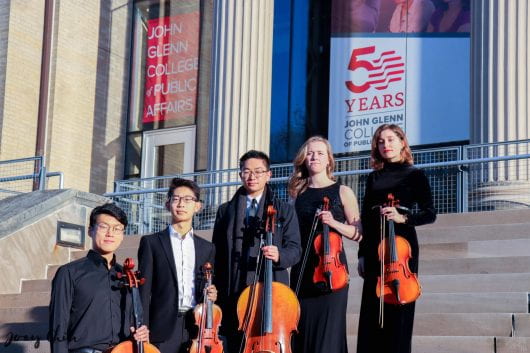All cellist Sungmin Park wanted to do was play a beautiful piece of music.
Park, a first-year graduate student in economics, had fallen in love with Schubert’s String Quintet in C Major. The only problem was the piece was written for a quintet; in order to play it, he would need another cello, a viola and two violins.
So he found them.
In fall 2019, Park invited cellist Andrew Fu, violist Madeline Otto and violinists Alex Ikezawa and Amanda Killian — all Ohio State alumni as of May — over for a pasta dinner, during which he had them listen to the Schubert piece.
“I distinctly remember Fu crying when we started listening to [Park] play it for the first time. It was a really beautiful moment, and it was filled with food and music,” Ikezawa said. “And yeah, it was kind of like the birth of our ensemble.”
The members all knew each other from the Buckeye Philharmonic Orchestra, a student-run symphony for non-music majors of which they had all, except for Park, been a part since their freshman year, Otto said. Although they were all familiar with one another, Ikezawa said they did not interact often until Park reached out.
“Sungmin, the newcomer, brought us all together,” Ikezawa said.
Park said practicing at Killian’s house became a normal routine, since it was spacious and her roommates didn’t mind the music. They also would sometimes meet together on Monday evenings before Buckeye Philharmonic, Otto said, to practice for an hour before the club started.
“It’s always been a nice thing to have in the background to kind of like have a creative outlet besides like engineering classes and stuff that can get pretty tedious,” Otto said.

Five members of the student-run symphony for non-music majors, Buckeye Philharmonic Orchestra, formed the Buckeye Quintet in January 2020. Credit: Courtesy of Joey Chiu.
Killian said they officially formed in January, and by February they had secured an appearance at an Ohio Union Activities Board event Feb. 16. A representative from the OUAB Gala reached out to Buckeye Philharmonic and asked for an appearance at the gala, Ikezawa said, and Buckeye Philharmonic suggested the newly formed Buckeye Quintet.
“We’re a lot more mobile, and it’s easier for us to play at these types of venues,” Ikezawa said.
Performing at the OUAB Gala was their first—and perhaps, their only, for the foreseeable future—performance as a group, Fu said, due to the COVID-19 lockdown and the fact that four-fifths of the group are graduating.
“We were planning more, but then everything got canceled,” Otto said.
Nevertheless, Park said just that appearance alone opened up for some special coaching from Miriam Burns, visiting professor and director of orchestral studies and conductor of the Ohio State Symphony Orchestra.
“She sat down with us for more than an hour, going through the nitty-gritty details of our Schubert piece, just before the gala show. I ask her maybe less than a week before the concert, and she said, ‘Oh, yes, I will do it,’ and it was such an amazing opportunity,” Park said.
Park, who has been playing cello for over 20 years, said there is something special about playing in a smaller group.
“It’s so different from playing by yourself or even playing in the orchestra, because playing in the orchestra, you do what the conductor wants you to do, and playing by yourself you do what your teacher mostly wants you to do, and it’s only when we have this really small group that we, I think, we become independent musicians,” Park said. “When we play together, we cannot go through every measure, every page, of the music, and we can’t do, ‘Oh, let’s interpret it like this’ — we can’t do that. It has to happen when we’re playing. And it’s that communication as we play, that magic, that brings me so attached to this format.”
Communication, Killian said, is what keeps them all aligned as they play without a conductor.
“If one person gets off, like, sometimes the rest of us will notice that and we’ll just skip to that part and follow the other person, and so it’s really cool; we kind of get each other,” Killian said.
For Fu, some of the magic comes from seeing how much his ensemble partners are enjoying themselves when playing.
“Whenever we play, I think any time that I look at Sungmin or anyone else, when they match your eye contact, they’re always smiling, which is really wholesome. It brings a lot of joy to me to see that everyone else is smiling,” Fu said. “It’s just so nice to be able to play with people who want to be playing with each other, and I think that helps a lot with the cohesiveness of us.”


